
MARTIALFORCE.COM
PRESENTS
AN INTERVIEW WITH
Eve Aronoff-Trivella Sensei
The Gold Standard
Interview by William Rivera Kyoshi
Edited by Lydia Alicea
MAY 2015

As parents and teachers we always tell our kids, just as we were told growing up, that if you work hard no matter how difficult things may seem, no matter how tough the road may be, if you believe you can achieve, and in working hard, you will succeed in life and in reaching your goals.
We are surrounded, and bombarded with a plethora of examples of hard working achievers that we admire, and I am sure that each of us can name a few. Despite this, there is a “disconnect” where people have difficulty with, particularly for youth, in the belief and the value of “hard work”; they perceive that achieving success is easier said than done. It is a pervasive disbelief or a lack of knowledge of what hard work can accomplish one that crosses all socio-economic levels. This is quite unfortunate because it equates to, “why bother?”
Perhaps part of the problem in this “disconnect” is that for far too many there lacks a tangible perception or understanding of what hard work entails and where motivation comes from. There are plenty of reasons, we have heard them all, but they are not important, not when there are plenty of examples of those who achieved “greatness” or “success” despite insurmountable illness or disability.
If there was ever a shining example of an individual who overcame her obstacles of illness and disability as a young child to later become a globally and nationally accomplished and decorated Judo martial artist, and who continues till today to impress us as a teacher, parent and wife, it is Eve Aronoff-Trivella Sensei.
Eve came from humble working-class roots whose parents from the Bronx understood the meaning of hard work, and value; she learned these values at a young age. Eve, at the age of five, developed rheumatic nodules in both her legs. Her prognosis was grim and doctors believed she would never walk again, or at best, would face tremendous challenges. For years, Eve suffered with great pain, was bed ridden and her condition resulted in secondary illnesses that required additional medical care. Yet, inside this young girl, there was a determination and a drive to work hard; it has never let up. Determination is not inherent; it is learned, encouraged, and nurtured.
As quoted in a local newspaper that profiled Eve and her participation in an upcoming Judo event at the local YMCA, “She was in a crippled condition for some time and by the time she went into Judo, she was determined to make her body, and her weak legs strong. The Daily News wrote, “Eve went from crippled kid to Judo Champion.” (The Evening News; April 28th, 1980)
Since her “ah moment” when she saw a Judo move for the first time, Eve’s burning determination to learn never let down, even in the beginning when she got her ass kicked. She began competing at the age of nine, after just one lesson against boys at the junior level; despite this, Eve had her second “ah moment,” she needed to focus and work even harder. Things clicked for Eve----- her cannot do became can do----where determination and hard work made her an accomplished martial artist.
Here is just a sampling of her many achievements:
· First Women’s’ Olympic Judo Team, 1988, Seoul, Korea, bronze medalist.
· National Championships, 1976, 1st place, 1977, 3rd place.
· Second International Invitational Y.M.C.A. Judo Tournament, 1979, Mexico City, Mexico 1st place individual and 1st place with team.
· Senior National Championships, 1978 through 1988, 1st or 2nd place each year.
· U.S. Open Invitational, 1981 through 1987, 1st or 2nd place.
· First Pacific Rim Judo Championships, 1980, Honolulu, Hawaii, 3rd place individual, 1st place team.
· World Judo Championships, 1982, Paris, France, 3rd place.
· First Fukuoka Woman's International Judo Championships, 1983, Fukuoka, Japan, 2nd place.
· World Judo Championship Trials, 1986 & 1987, 1st place.
· 1978/1979 Metropolitan Judo Association, outstanding female competitor.
· 1983 Proclamation of Achievement from Yonkers major, Angelo Martinelli, for outstanding achievement in the sport of Judo.
· 1983 Outstanding U.S.J.A. Female Judo Competitor.
· 1984 Outstanding U.S.J.A. Senior Competitor.
· 1985 and 1991, honored by the Woman's Sports Foundation.
Eve’s success is inspiration to her children, students and to all of us. Indeed, she is the “Gold Standard”, a model of excellence, a supreme example by which others are judged and measured against.
Lydia Alicea
Writer for Martialforce.com


Martialforce.com: Let us start at the beginning, where were you born or where did you grow up as a young girl? Were there circumstances growing up that may have necessitated a draw to self-defense?
Eve Aronoff-Trivella: “I was born in the early 1960’s to Harold Aronoff and Gloria Cottenna in the Pelham Bay section of the Bronx, New York, although, I never lived in the Bronx. My parents were born and raised there. They moved to a modest house in a middle class town, Hartsdale, New York. My father worked as a chicken plucker when they first married and my mother was a stay at home wife. My father eventually made a great business for himself as a wallpaper hanger working very long hours from 6am to 8pm to provide a home for our family in Hartsdale.
When I was about six years old, I had strep throat, which developed into rheumatic fever. I was unable to walk for a long time and needed to stay home from school due to great pain in my legs. During that time, I watched a lot of television became very weak and overweight from lack of walking, and due to my medication regimen, which included steroid treatments. One day, I saw a commercial for Jerome Mackey, where they demonstrated a beautiful Judo throw. As they say, it was love at first sight! Obviously, I was incapable but I became obsessed with wanting to learn how to throw. I harassed my mother constantly. With my headstrong personality, when told I cannot do something, it motivates me to want to do it even more.
One day, my mother spoke about my obsessive quest to learn Judo with my doctors. They felt that it would be great rehabilitation for me, so, one day she brought me to a local martial arts school. I began Judo classes at the age of nine in 1972. After a while, I found it to be boring because all I did was falls, falls, and more falls. I was the only girl at the school but this did not bother me. When I completed my first lesson, my judo instructor sent me to a competition where I competed against boys that were blue and purple belts (equal to a senior brown belt). Needless to say, it was a good thing I learned how to fall well, because that is exactly what I did one second after I bowed in to my first match and the same happened for my 2nd. This went on for about two years.
During a competition, my mother turned to me and said, ‘Are you going to do something today or are we leaving with our tail between our legs, again?’ She was right. I got tired of getting my ass kicked and wanted to make my mother happy. Something clicked inside me because from that day, things changed, I began winning and it felt good! I was becoming good at something physical after not being able to, for far too long.”



Martialforce.com: During that time, as today, people perceive the martial arts as violent. Was this the case with you?
Eve Aronoff-Trivella: “When I first saw Judo on television, I never thought of it as something violent. I was a little girl who saw a beautiful Judo throw and thought it would be a real cool thing to do. My thought is that if you learn something to deliberately attack and hurt, then it is a violent act. Judo is defensive not offensive. The founder of Judo was simply trying to teach us how to defend yourself if attacked.”
Martialforce.com: Speak to us about your years of competition.
Eve Aronoff-Trivella: “I competed in the Junior National Championships in 1976 where I took 1st place and in 1977 where I took 3rd place. I competed in many other national as well as international competitions from 1978 to 1991. Again, there were many such as the US Open Invitational (1981 to 1987), First Pacific Rim Judo Championships, Honolulu, Hawaii (1980), Canada Cup International Judo Championships, Quebec (1981), First Russian Woman’s International Judo Championships, Moscow (1985), Pan America Judo Championships, Havana, Cuba (1985), Austrian Open International Judo Championships, Leonding (1988) and the Ontario Open International Judo Championships, Ontario Canada (1990.)
In 1988, I had the honor of being a member of the First Woman’s Olympic Judo Team in Seoul, Korea where I placed 6th. During the years that I competed, a number of local coaches as well as the coaches who traveled around the world with us on the U.S. team trained me. My coaches were Joe Gray, Yoichiro Matsumara, and, U.S. team coaches, Jim Hrbek and Rusty Kanokogi. I trained with Rusty and her husband in Brooklyn for many years until I retired from competition.”




Martialforce.com: Did you train in other martial arts?
Eve Aronoff-Trivella: “My first Judo instructor introduced me to boxing, kick boxing and he loved having me break boards. I would practice in the children's class from 4:00 PM and later 6:00PM to 7:00PM and 7:30PM to 9:30PM, I trained in the adult class followed by an hour of conditioning.”
Martialforce.com: Who were your early influences?
Eve Aronoff-Trivella: “My coach, Joe Gray, an “unsung hero,” though not an accomplished Judo competitor was one of the best coaches of my day. His influence was his ability to keep me in a state of mind where I was consistently sharp, clear, open-minded and peaceful like a Buddhist monk. He constantly studied my opponents, strategically picking their moves apart, showing me how to beat them with my techniques. On the mat, he created outstanding drills that helped me win in world championships.
Yoichiro Matsumara was an outstanding competitor in his day, a champion in Japan and tied twice with the great Okano, a 1964 Olympic gold medalist. Matsumara taught me techniques that to this day are still amazing. His technical skills were superior to most Judo artists around the world. Rusty Kanokogi was a tough woman and an accomplished competitor. She trained me to be mentally and physically tough.
I considered Jim Hrbek as one of my greatest coaches. Very similar to Joe Gray but Jim had competitive experience. He has a great strategic mind, very technical and great at dissecting your opponents’ moves.”
Martialforce.com: When did you receive your Shodan?
Eve Aronoff-Trivella: “In 1978, I received my Shodan at the age of 15 (my Nidan in 1981, Sandan in 1984 and Yodan in 1994 given by Phil Porter (former USJA President.) The Shodan test entailed demonstrating all techniques for every rank up to black belt in addition to completing three katas.”
Martialforce.com: What rank do you hold today? Describe the ranking system in Judo.
Eve Aronoff-Trivella: “I presently hold a Godan which represents a fifth degree black belt. In Judo, the ranking system begins with a white belt, followed by yellow, orange, green, blue, purple belts, 3 degrees of brown belts, called kyu, then black belt with degrees beginning with 1st up to 12th. All the lower colors are the junior rankings. Seniors go from white, yellow green, 3 browns, and then the black belt degrees. It can vary for certain dojos. Various levels allow children to progress gradually before reaching higher ranks.”
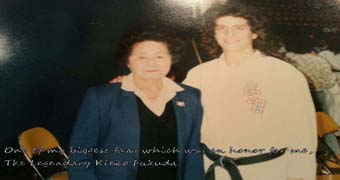
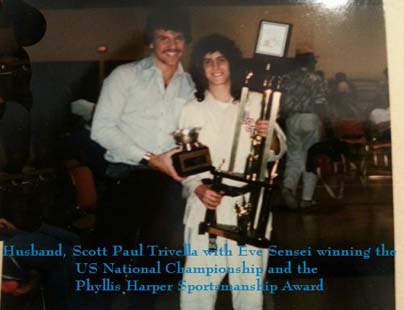
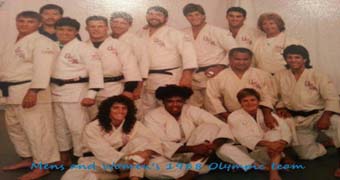
Martialforce.com: With all the many things you do as a parent, teacher, plus your previous injuries and the grind that working out has on the body and mind, how do you keep yourself motivated?
Eve Aronoff-Trivella: “I believe my biggest source of motivation comes from my children. I want to show them that it is important in life to keep going no matter the obstacles or challenges. I have always told them to make a difference in their lives because when you are not moving or doing something positive, one cannot accomplish things. When you cannot improve yourself, how can you be able help others make helpful changes in themselves?
Down the road, I wish to be recognized as a woman who pioneered in Judo at a time when women competitors were far and few and made her contributions by being a member of the first Women's Olympic Judo Team as well as achieving many firsts for females in my sport. Today, it is important that I continue to be active while enhancing people’s lives. That is what inspires me, motivates me. With all my injuries including several hip replacements, I can still show people that you can keep a healthy fit body without hurting yourself, by just doing your best at whatever age and physical level. I teach fitness and Judo to my clients by example.”
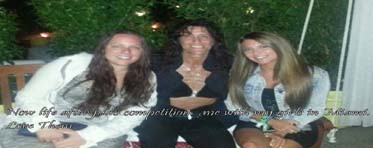
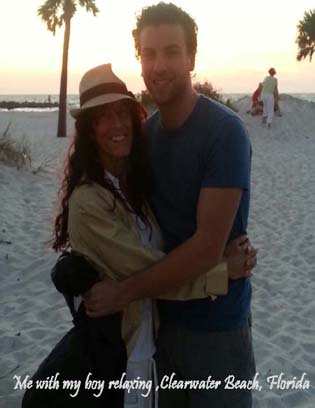
Martialforce.com: After injuries and the physical toll, have you ever considered giving up martial arts, or is it so much a part of your life that the thought has never entered your mind?
Eve Aronoff-Trivella: “I am not physically practicing Judo every day, yet, with my experience and accomplishments and my dedication to Judo, I can never give it up. There may have been times in my life when I was much less involved than others were, but I live my life based on what I have learned, and experienced in Judo. I begin my day with a positive purpose. I try to live my life like a Judo match, every movement and every second with a purpose.”
Martialforce.com: What are “Boodo”classes?
Eve Aronoff-Trivella: “From years as a fitness and Judo instructor, I always wanted to create an exercise class. I created Boodo, a fitness program that is a mix of boot camp training, Judo training, and other physical exercises. I will most likely start another class in the spring of 2015. For anyone interested, please contact me through my email: Judoeve63@gmail.com.”
Martialforce.com: Explain Judo’s practical application towards self-defense.
Eve Aronoff-Trivella: “Judo is considered a great self defense art, not created to be an offense art. You train to react to your opponent’s attack by learning through different situations that can arise. In Judo, chokes are very simple, and their use is very effective in defending oneself. It is very easy to control a situation with a choke, but it will always depend on how the assailant attacks you. That will determine your response.”
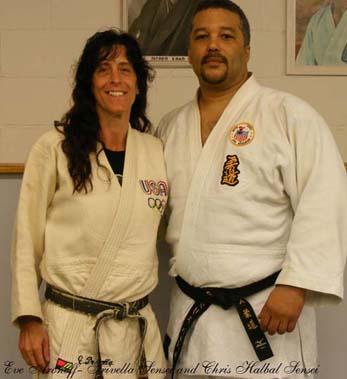
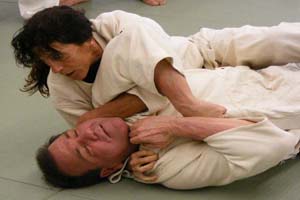
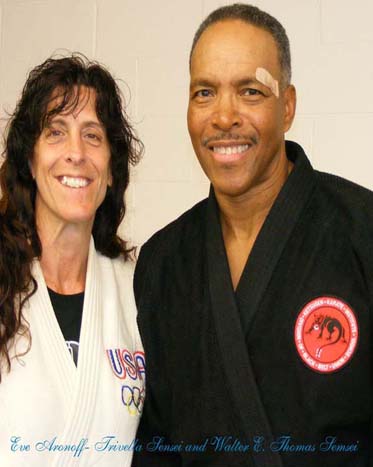
Martialforce.com: In Judo, is there a difference between being an instructor and being a coach?
Eve Aronoff-Trivella: “There is definitely a difference. An instructor can teach you all of the basics even advanced techniques in Judo but not necessarily for competition. Needed for competition is the ability to analyze movements and develop strategies in respond to situations as they arise. A coach needs to have the ability to study your opponent’s style and be able to show you how to beat them. For an instructor, it can certainly help in some ways but not necessary for instruction; more important is to be a good strategist.”
Martialforce.com: Which competitions in particular stand out for you, and why?
Eve Aronoff-Trivella: “There are several memorable competitions for me. One was the 1982 “World Judo Championships” in Paris, France. I was 19 years old and it was my first international competition (I later participated in 1986 in Holland and in 1987 in Essen, Germany.) I won the bronze medal where I fought my guts out to win and proudly brought it home.
In the following year, I competed at a world tournament called, “The Fukuda International Women's Judo Championships” in Japan. It was my first match against Beatrice Rodriguez from France. Beatrice was the World Gold Medalist from the previous year when I took home the bronze. No one has ever intimidated me because I believed that I was the best and competitive enough to win in any match. A few seconds into the match I choked her unconscious and proudly brought home the silver.”
Martialforce.com: As mentioned by Chris Halbal Sensei and others, you competed against Ann Maria De Mars, the first person representing the U.S. to win a World Judo Championship, and mother of Rhonda Rousey, current UFC Women’s Bantamweight Champion. Please describe your match(s).
Eve Aronoff-Trivella: “I have great respect for Ann. I am the only woman in the world to have choked her unconscious; she is the only woman in the world to ever arm bar me. Unfortunately, she won more matches against me then I against her but they were always great fights. Our matches were very physical as well as very strategically challenging. After I took the bronze medal in the 1982 World Championships, I expected to go back in 1984 and take a gold metal; Ann beat me at the 1984 World Championship Trials, which meant she would be going and not me. I remember looking at her and saying, ‘Well, if you took this away from me and I can't go, you better take the gold medal!’ She responded, ‘Oh, I plan on it do not worry!’ We both laughed!”
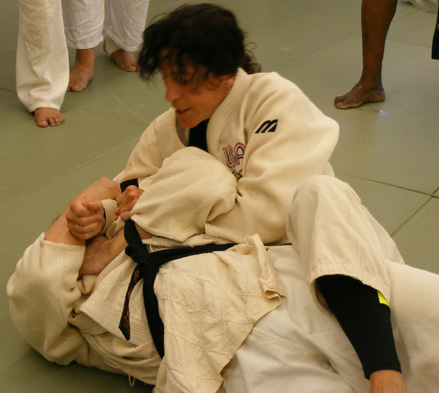
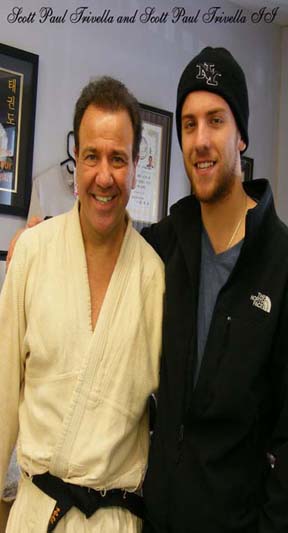
Martialforce.com: Describe the different training methods, between competitive and fitness.
Eve Aronoff-Trivella: “A competitive judo player needs to be able to have an arsenal of training methods that is unique. The method of training is unlimited from heavy strength training, to lighter more repetitious strength training, to resistance training to circuit training and isometric training. You need everything for Judo but mostly, fast repetitious circuit training that works the fast twitch muscles. Sprints are part of this equation as well but do not neglect running a few miles. A more skilled athlete can make you the best judo player. In the prime of my life, I was physically capable of everything and anything.
When older and more limited age wise and injury wise, we have to modify our physical activity. We need to make sure that we never stop moving in order to keep the mind, and body alive. As I mentioned previously, I have had two hip replacements because of the physical intensity I endured for many years. I have injured every bone in my body.
For fitness training, you want to stay strong and flexible without hurting yourself. That is what exercise for fitness should be, safe and effective, strength and flexibility. I love circuit training, biking, wall climbing, resistance training, hitting the heavy bag, lightweight training and stretching. You want to keep your muscles, surrounding the injuries strong, and flexible. Of course, cardio is always included because the heart needs to stay strong. I never use heavy weights because that would put too much stress on my fake hips, and other old injuries.”
Martialforce.com: Describe your years as an instructor.
Eve Aronoff-Trivella: “I have taught Judo with Rusty Kanokogi in many private schools throughout New York City, like the Lenox School as well as F.I.T. I taught at the Kyushu Judo School in Brooklyn, Nisei Judo in the Bronx, and the Y.M.C.A. in Yonkers, NY. For many years, I have had my own program for children in Thornwood, NY. In addition, I have provided Judo instruction and fitness classes privately as well as in groups for the last 30 years. Also, I am an instructor at the Bronx Judo and Martial Arts and continue to hold seminars at different martial arts schools in New York.”
Martialforce.com: How did you overcome the difficulties post surgery to be able to return to Judo?
Eve Aronoff-Trivella: “Returning to Judo was trouble free after the surgeries since I have always kept myself strong and healthy. My new hips are painless whereas the old real ones were severely injured and very painful. I was barely able to walk. I need to remember that although I feel great, the hips are replacements and if I want them to last then I must be wise with my physical choices. It is important that I take care of my other injuries as well. I have injuries all over. The problem I encounter with the replacements is that although they work fine, they do affect my movements and I encounter some stiffness; this can aggravate other injuries like the knees and back. Therefore, my response to this is to work on my strength and flexibility. If I keep the muscles around my injuries strong, and flexible I can avoid making them worse.
At this point in my life I want to preserve my body and keep the muscles strong and flexible so the muscles can support the joints.”
Martialforce.com: Is there a word, a quote, or saying that best describes you?
Eve Aronoff-Trivella: “Intense and recluse, best describes me, and those two words can be built upon on many levels for me. My intensity is constant from simple things to extremely complex; waking up in the morning to being an Olympic athlete; being a mother, being a wife, friend, daughter, motivator, and women’s advocate.
Each day my mindset is to make a difference and I live with the same intensity as when I fought my Judo matches, to make every second of every minute count. Every move has to make a difference and needs to have a purpose and you must have short and long-term goals. Unlike in a team sport, Judo requires total responsibility for an individual’s actions, where one must own up to what you have or do not have in whatever situation.
I also describe myself as a recluse. If given the choice, I prefer to stay home whether it is in my backyard in the summer meditating, and working out, or, in the winter staying in by the fire, and working out rather than going out with friends. I prefer to deal with issues on my own and enjoy time with my children and husband. They are my priority. It is not that I am anti-social; to the contrary, with people, I am very friendly and outgoing.
Perhaps that is why Judo goes so well with my personality. When you are on the mat, it is just you, and your opponent. I also enjoy hobbies, and sports that are individual in nature such as wall climbing, shooting, chess, one on one. You need to be complete as an individual so you can be valuable to others. It goes hand and hand with the founding principles of Judo philosophy. Jigoro Kano felt that you should improve yourself to the maximum in order to become a better citizen and valuable to the people around you. For me, it is all about making a difference in life...a positive difference. That is what I try to teach my children and students.”
William Rivera: “I had the opportunity to first meet Eve Aronoff-Trivella Sensei at Sifu Alan Goldberg’s annual Action Martial Arts Event in Atlantic City, N.J. Later on, Chris Halbal Sensei invited me to attend a seminar at the Bronx Judo & Martial Arts on Tremont Avenue in the Bronx. It was there that I witnessed Eve in action. Her execution of technique exemplified the essence of the Gentle Way (Judo) with flawless transition from standing to ground, followed by an explosion of power from a relaxed state. I witnessed pure martial art and I am forever grateful to Chris Halbal Sensei for this opportunity.”
On behalf of Martialforce.com, thank you Eve Aronoff-Trivella for the opportunity in presenting this interview.